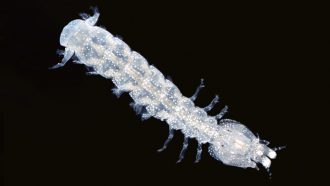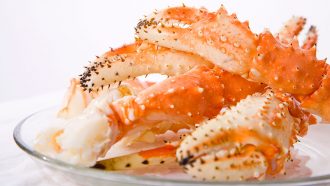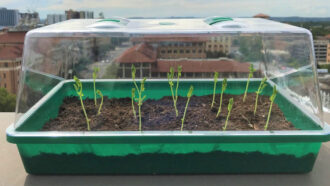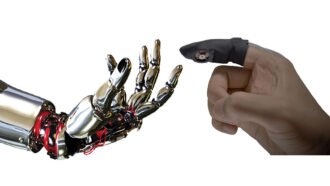HS-PS2-6
Communicate scientific and technical information about why the molecular-level structure is important in the functioning of designed materials.
-
 Tech
TechMantis shrimp inspires somersaults of new soft robot
Its rolling acrobatics allow this robot to move especially swiftly — much as a fictional new Disney character can.
-
 Materials Science
Materials ScienceCopper ‘foam’ could be used as filters for COVID-19 masks
The lightweight new material could serve as a washable and recyclable, eco-friendly alternative for many current mask filters.
By Sid Perkins -
 Brain
BrainPatterns in brain activity can identify who will struggle to read
Certain patterns of brain activity predict whether teens are strong readers or will struggle. Those diagnostic patterns show up even when doing math.
-
 Materials Science
Materials ScienceBandages made from crab shells speed healing
The chitin in seafood wastes, insect “bones” and fungi is a chemist’s dream. Used in a new medical dressing, it beats regular gauze for wound healing.
-
 Physics
PhysicsScientists Say: Piezoelectric
Piezoelectric materials produce an electric voltage when they are bent or squished. This can let us harvest electricity from movement.
-
 Agriculture
AgricultureDew collector brings water to thirsty plants
This invention grabs water from the air at night. All it needs is the sun’s warmth the next day to release that moisture to growing plants.
-
 Tech
TechBye-bye batteries? Power a phone with fabric or a beacon with sound
New piezoelectric systems produce electricity in unusual ways, such as when a certain nylon bends or underwater ceramics vibrate.
-
 Chemistry
ChemistryA soil-based ‘concrete’ could make buildings green, even on Mars
A new soil-based material offers an alternative to concrete for 3-D printing environmentally friendly buildings.
-
 Environment
EnvironmentWhy today’s ‘fast fashions’ can be bad for the planet
The constant buy-wear-toss cycle of fast fashion isn’t sustainable. It hurts the environment and takes a toll on our wallets, too.
-
 Environment
EnvironmentOld clothes soon may be recycled, not trashed
One day, clothes may be recycled almost as much as plastics and glass are now. See how chemists are moving us in that direction.
-
 Chemistry
ChemistryHere’s how to make flip-flops biodegradable
Innovative flip-flops made from an algae-based plastic decompose in soil or compost. The comfy shoes also avoid use of fossil fuels.
-
 Tech
TechThis artificial skin feels ‘ghosts’ — things you wish were there
Engineers have developed a wearable device that simulates the sense of touch. It may benefit robotic surgery and deep-sea exploration.